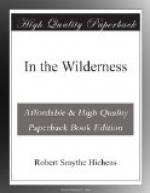The pleasurable excitement of a deer-hunt has never, I believe, been regarded from the deer’s point of view. I happen to be in a position, by reason of a lucky Adirondack experience, to present it in that light. I am sorry if this introduction to my little story has seemed long to the reader: it is too late now to skip it; but he can recoup himself by omitting the story.
Early on the morning of the 23d of August, 1877, a doe was feeding on Basin Mountain. The night had been warm and showery, and the morning opened in an undecided way. The wind was southerly: it is what the deer call a dog-wind, having come to know quite well the meaning of “a southerly wind and a cloudy sky.” The sole companion of the doe was her only child, a charming little fawn, whose brown coat was just beginning to be mottled with the beautiful spots which make this young creature as lovely as the gazelle. The buck, its father, had been that night on a long tramp across the mountain to Clear Pond, and had not yet returned: he went ostensibly to feed on the succulent lily-pads there. “He feedeth among the lilies until the day break and the shadows flee away, and he should be here by this hour; but he cometh not,” she said, “leaping upon the mountains, skipping upon the hills.” Clear Pond was too far off for the young mother to go with her fawn for a night’s pleasure. It was a fashionable watering-place at this season among the deer; and the doe may have remembered, not without uneasiness, the moonlight meetings of a frivolous society there. But the buck did not come: he was very likely sleeping under one of the ledges on Tight Nippin. Was he alone? “I charge you, by the roes and by the hinds of the field, that ye stir not nor awake my love till he please.”




